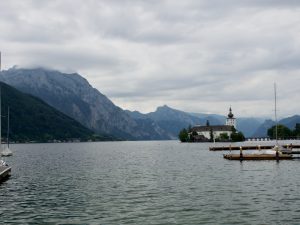
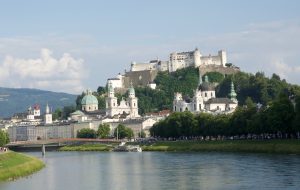
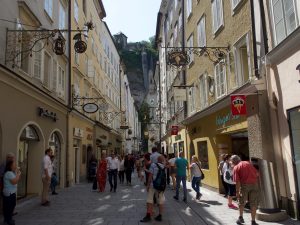
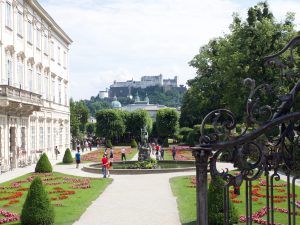
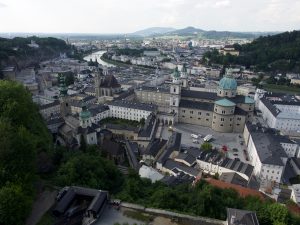
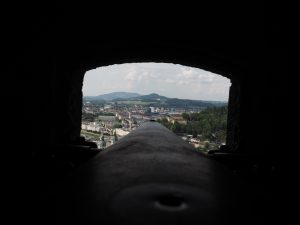
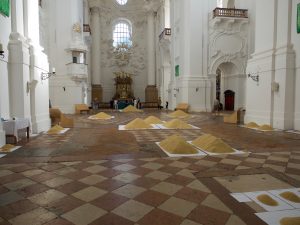
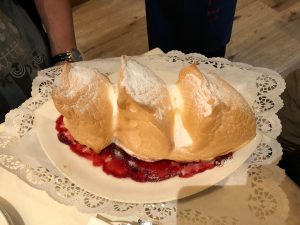
In contrast to yesterday, today was not low-key at all, despite a slow start with a leisurely breakfast at Michl‘s. We walked to his house at about 7:30, picking up fresh rolls on the way, and then had breakfast on his deck and talked. The weather was again very nice and it was already quite warm. A little before 10, we drove the 10 minutes to Gmunden—Michl dropped us off before getting Silvia, his wife, who had shoulder surgery on Thursday and was released from the hospital this morning to go home (we still haven‘t seen her but we will on Sunday!). So we got to explore Gmunden while Michl got her settled at home etc. Gmunden is a lovely little town of about 10,000 right on the Traunsee, one of the lakes that dot the landscape between Michl‘s town of Laakirchen and Salzburg. It is basically built right on the banks of the river and has a lakeside promenade that has attracted tourists since the 1900s. The lake is surrounded by mountains that are part of the Salzkammergut, with the Traunstein mountain (also known as the „guardian of the region“) on the other end of the lake hovering over the town. We walked through the downtown area and down to the lake, where there was a flea market all along a half mile or so of the promenade. A lot of people were selling used Gmunden ceramics, since the town is famous for a couple of specific ceramic patterns, one a distinctive green-and-white design with loose brushstrokes. I actually ended up buying a single egg cup in that pattern, and also a copy of a German book for a friend–our first non-food purchases since Geneva! We continued along the lake until we came to a tiny lake island with a castle on it, Schloss Ort. It is so close to the shore that a short footbridge gets you there, and you can walk around it in about 5 minutes or less. It‘s very cute, with a regionally characteristic onion-shaped dome on its tower, and a popular destination for wedding ceremonies. (In fact, there was a wedding party waiting their turn when we crossed the bridge).
We turned around and went back along the lake the other way for a bit, checked into the cute little book store that Michl‘s sister owns (although we only bought a greeting card there—I am not in a reading mode right now and have been dragging my book along with me unopened for over a week now), and then took advantage of a street food festival to have some French crepes (savory and sweet) for a light lunch right on the lakeside. Michl picked us up again at about 1 pm, and then we took the scenic route to Salzburg, which was gorgeous. The winding road between the famous lakes of the region (Attersee and Mondsee in particular are popular tourist destinations, and some sort of plankton action makes them a bright turquoise—gorgeously nestled in between big chunks of granite and forest-covered hills) makes this a popular motorcycle route, and it was really pretty. There were many scenic spots and a gorgeous ravine to look down into. We also took a detour to see the idyllically situated boarding school where Michl went as a high-schooler, learning a trade alongside high-school.
We arrived in Salzburg around 3 pm and Michl showed us the highlights. We walked through the Baroque-style Mirabellgarten, the lavish park surrounding the former palace of the bishop (now the state administration building), including a strange area with baroque-era statues of dwarves, the Zwergengarten—we are not talking about garden gnomes, but over-life size statues of people in various traditional attire that looked like people with dwarfism, although their heads seems much too large. Then we crossed the Salzach river on a footbridge thronging with tourists to get to the most famous part of Salzburg—the old town, especially the Getreidegasse, a very long shopping street with traditional „pub sign“ style hanging brass signs for every shop—some actually old, but others, like the McDonald‘s sign, made to imitate the old style. The mix of modern-day shopping and 17th century city street was pretty bizarre; the culmination was that Mozart‘s birth house, right in the middle of this street, has a museum at the top, but a chain store (a SPAR—common in Germany and the British Isles alike) on the ground level. We bought cheap bottled water there because it was so hot, but it did prominently display the famous „Mozartkugeln,“ chocolate concoctions wrapped in gold foil that were a 19th century Salzburg invention and are sold the world over by way of Mozart‘s famous name. (As Michl pointed out, Mozart was born in Salzburg but actually spent most of his time in Vienna.)
The culmination of the tourist tour of Salzburg was, of course, the actually fortress / castle on top of the hill itself. We did not take the stairs but bought tickets for the funicular, the very steep railway that takes tourists in groups of 100 or so up to the castle buildings, some of which were used as barracks until the 19th century, so they are in very good shape. The area is huge, has two restaurants with seating along the outer walls and various exhibits, including of some Romanesque foundations that were only excavated in the 1990s. We didn‘t look at everything, but we had a good time wandering around; then we descended again in the funicular (I am so excited to use this wonderful word twice!). Michl led us to a great nearby bar/Café built right into the side of the mountain underneath the fortress, the Stieglkeller, where we sat outside with our beers/sparkling waters overlooking all of the Salzburg downtown with all of its densely packed churches—mostly baroque, with a little Gothic Franciscan church right in the middle. We walked to and into one of them, the big late baroque Kollegienkirche, where an art collective from Britain, Stan‘s Cafe, hosts an exhibit that represents various worldwide population statistics with grains of rice. Apparently, they add new exhibit pieces (piles of rice on pieces of paper and an explanation of what they represent) while the exhibit is going on. Some are very serious (enormous pile for refugees worldwide), some stunning (EVEN LARGER pile for daily visitors to McDonald‘s worldwide); some were Salzburg- or Austria-related, and some just plain silly (one Michael Jackson grain of rice).
Then we were done with our tour and found our way to the restaurant where we were to meet with the other Bowling Green people (this time, Laurie and an undergraduate from 1989-90, Tom Miller, were the only ones from our year, but we also chatted with the German professor that started at BGSU the year after we left, and with some people who were in the program in the early 2000s; one is now a German professor at Long Beach. We had to sit inside, unfortunately (the restaurant couldn‘t open their entire outside seating to the 50 or so of us), and it was quite hot, but we opened a couple of doors and were ok. We had a good time and good food—Mark had his first Schnitzel and I had a Pilzgulasch with a lovely steamed dumpling in the middle, and we ordered Salzburger Nockerln for the Michl, Mark, and me so Mark could try them—they are a soufflé-style dessert that‘s mostly egg whites and hard to make at home without making them fall apart, so it was pretty special—and also very light.
We had had a long day and still had the hour‘s drive to Laakirchen ahead of us, so we left relatively early—still after 9:30, so we were home about 11 and pretty much crashed right away.